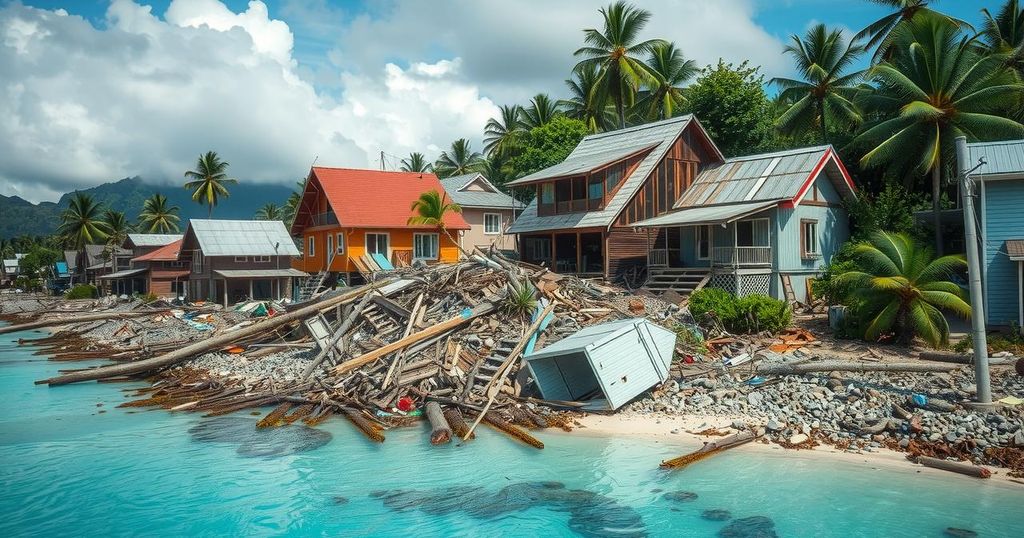Devastating Impact of Cyclone Chido and Vanuatu Earthquake: A Call for Humanitarian Response

Tropical Cyclone Chido and a 7.3-magnitude earthquake in Vanuatu have resulted in significant destruction and loss of life across several regions. Direct Relief is actively assessing and addressing the healthcare needs of affected communities in Mayotte, Comoros, Mozambique, and Vanuatu, providing critical medical supplies and support in the aftermath of these disasters. Natural catastrophes pose both immediate and long-term health risks, necessitating a robust response to mitigate their effects on vulnerable populations.
Over the past weekend, Tropical Cyclone Chido created a path of destruction in the Mayotte archipelago, Comoros, and Mozambique, resulting in significant loss of life and extensive property damage. This calamity was compounded shortly thereafter by a 7.3-magnitude earthquake that rattled Vanuatu, further challenging communities already vulnerable to disasters.
Cyclone Chido has been classified as the most intense storm to impact Mayotte in over nine decades. The winds exceeded 140 miles per hour, coupled with storm surges reaching 28 feet, obliterating entire neighborhoods, notably in areas inhabited by undocumented migrants. The official death toll in Mayotte stands at 22; however, casualty figures are anticipated to rise significantly as damage assessments progress.
In the neighboring Comoros, Cyclone Chido inflicted similarly destructive winds and torrential rainfall, resulting in considerable havoc across the islands. Comoros President Azali Assoumani has declared a week of mourning for the victims, highlighting the massive damage to the nation’s infrastructure. With its already precarious condition, Mozambique also faced severe impacts as the cyclone made landfall, with winds exceeding 160 miles per hour damaging homes and healthcare facilities across Cabo Delgado province.
Direct Relief is presently engaged in evaluating the needs of those affected. In Mayotte, discussions are taking place with French emergency response agencies to provide immediate healthcare support. Concurrently, in Comoros, Direct Relief is collaborating with Santé Diabète, a French non-governmental organization focused on diabetes care, to assess the situation and offer assistance. Outreach is being conducted with Mozambique’s Ministry of Health to supply emergency medical provisions as the evaluation of damage continues.
Meanwhile, Vanuatu is grappling with the aftermath of a powerful earthquake that registered 7.3 on the Richter scale. While damage evaluations are still in their early stages, preliminary reports indicate substantial devastation to residential areas, public infrastructure, and healthcare facilities, coupled with the ongoing threat posed by aftershocks. Direct Relief has activated coordination efforts with local healthcare systems to ascertain urgent medical needs, dispatching essential medicines and medical supplies to Vanuatu in the coming week.
Natural disasters such as earthquakes and cyclones pose acute and chronic health hazards. They frequently lead to mass casualties and overwhelm healthcare capacity through the destruction of critical infrastructure. The secondary effects of such calamities include the following:
1. Disease Outbreaks: Cyclones cause flooding, contaminating water supplies and increasing the risk of cholera, malaria, and other waterborne diseases.
2. Displacement: The destruction of homes and healthcare infrastructure compels individuals into overcrowded shelters, enhancing the risk of transmission of communicable diseases.
3. Chronic Health Disruptions: The interruption of care for chronic conditions is perilous for vulnerable patients, particularly those with diabetes or hypertension.
4. Maternal and Infant Health: Disruptions in healthcare services for pregnant women and infants can severely impact their health and survival due to limited access to emergency obstetric care.
Direct Relief addresses these challenges by ensuring that vital medical supplies, including trauma care and vaccines, reach frontline healthcare providers.
Direct Relief’s extensive history in responding to devastating natural disasters underscores its commitment to delivering critical medical assistance. In the aftermath of Cyclone Idai in 2019, the organization successfully provided over 100 tons of medical aid across Mozambique, Zimbabwe, and Malawi. For years, Vanuatu has benefitted from Direct Relief’s support in fortifying healthcare systems, with ongoing deliveries of emergency medical supplies following cyclones and earthquakes.
Similar efforts have been noted in Türkiye and Syria amid the aftereffects of the 7.8-magnitude earthquake in February 2023, where Direct Relief delivered over 1,000 tons of medical aid to support healthcare responders. Past collaborations following significant quakes in Nepal (2015) and Haiti (2010) involved emergency shipments and infrastructure rebuilding efforts, creating resilient healthcare support structures.
In 2019, Cyclones Idai and Kenneth devastated Mozambique and neighboring countries, inciting widespread cholera outbreaks. Direct Relief’s response included over 100 tons of emergency medical aid focusing on trauma care and maternal health.
Direct Relief also employs a proactive approach, maintaining hurricane preparedness programs that stockpile medical supplies in areas prone to tropical cyclones. This multifaceted strategy not only facilitates immediate disaster relief but also contributes to long-term recovery efforts in affected communities.
In light of the continued impact from Cyclone Chido and the Vanuatu earthquake, Direct Relief remains steadfast in its mission to support healthcare professionals on the ground, assist communities in recovery, and ensure that life-saving medical care reaches those who need it most.
Tropical Cyclone Chido has recently devastated several regions in Africa and the Pacific, presenting an acute challenge to healthcare systems already strained by vulnerabilities. The cyclone’s impacts were felt severely in Mayotte, Comoros, and Mozambique, while a subsequent earthquake further endangered populations in Vanuatu. Direct Relief, an organization dedicated to disaster response, has mobilized resources to assist in humanitarian efforts, aiming to provide essential medical care and supplies to those affected by these disasters. The health threats posed by these events extend beyond immediate physical injuries, as they create conditions ripe for disease outbreaks, displacement, and disruption of care for chronic illnesses.
In summary, the dual crises caused by Cyclone Chido and the earthquake in Vanuatu underscore the urgent need for effective disaster response mechanisms. As Direct Relief continues to mobilize essential medical aid and coordinate with local healthcare providers, the focus is on addressing both immediate and long-term health impacts resulting from these natural disasters. The commitment to rebuilding healthcare infrastructure and supporting communities in recovery is crucial as affected regions face ongoing challenges from the aftermath of these catastrophic events.
Original Source: www.directrelief.org






